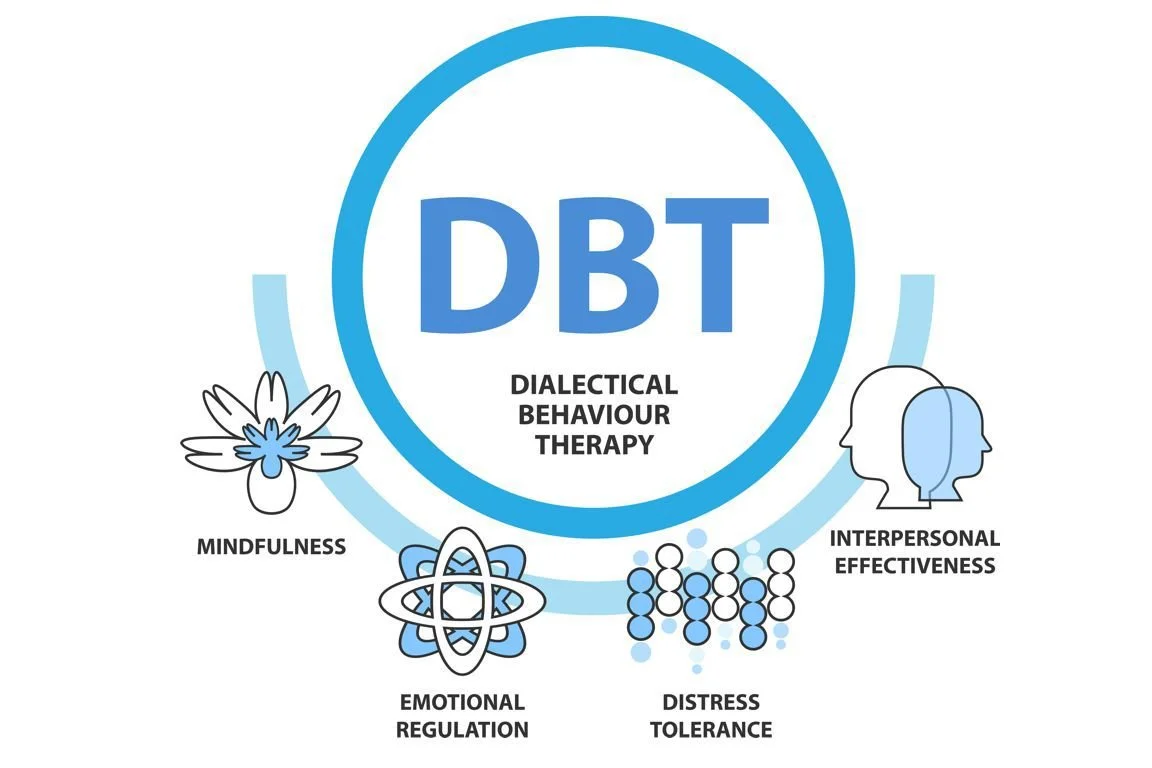Exploring the Benefits of DBT for Emotional Wellness in Okotoks
This dialectical behavioral therapy (DBT) approach is specifically designed to help individuals effectively manage overwhelming emotions and improve their interpersonal relationships. It has been shown to be particularly effective for those facing challenges such as anxiety, depression, and emotional dysregulation. In various settings, trained professionals offer tailored sessions to provide therapeutic support that is based on evidence-based cognitive-behavioral therapy (CBT) skills. The goal of these sessions is to help you develop the necessary skills to regulate your emotions and communicate more effectively in your relationships. Our therapists focus on providing practical tools and strategies that can be applied in everyday life situations. Through this program, you will learn how to better cope with distressing emotions and manage stress more effectively. By participating in DBT sessions with our experienced therapists, individuals may experience improved mental health outcomes and a greater understanding of their own behavior patterns. The effectiveness of this approach lies in its emphasis on mindfulness, emotion regulation, communication skills training, and coping mechanisms for dealing with challenging situations. If you are looking for a therapeutic approach that can help you navigate through life's challenges while improving your emotional well-being and relationships, DBT may be the right fit for you. Contact us today to learn more about how our DBT program can benefit you or someone you care about.
What is DBT?
This structured form of psychotherapy integrates cognitive-behavioral techniques with mindfulness practices. Originally developed for individuals with borderline personality disorder, it has been adapted to address a variety of mental health issues. The core components of this approach include:
Mindfulness: Cultivating a non-judgmental awareness of thoughts and feelings.
Distress Tolerance: Developing skills to cope with emotional pain and stress.
Emotional Regulation: Learning to manage and respond to intense emotions effectively.
Interpersonal Effectiveness: Enhancing communication skills and relationship dynamics.
Key Advantages of This Therapeutic Approach
Engaging in DBT can lead to significant improvements in various aspects of life, including:
Greater emotional stability and resilience.
Improved relationships through enhanced communication and understanding.
Increased self-awareness and mindfulness practices.
Reduction in self-destructive behaviors and suicidal thoughts.
Choosing the Right Therapist
When selecting a therapist, consider the following tips:
Verify their credentials and experience in this therapeutic approach.
Read reviews or testimonials from past clients.
Ensure they provide the specific type of therapy you are looking for, whether individual or group sessions.
Pros and Cons of Dialectical Behavior Therapy
Like any therapeutic approach, DBT has its advantages and disadvantages. Here’s a breakdown to help you understand what to expect:
Pros
Effective for a range of mental health issues, including BPD, anxiety, and depression.
Focuses on building practical skills for emotional regulation and interpersonal effectiveness.
Incorporates mindfulness practices that can enhance overall well-being.
Can lead to significant improvements in relationships and quality of life.
Cons
Can be time-consuming, requiring a commitment to regular sessions.
May not be suitable for everyone; some individuals may prefer other therapeutic approaches.
Requires active participation and effort from the client to see results.
Therapists must be specifically trained in DBT, which may limit availability.
What to Expect in a DBT Session
Understanding what happens during a typical DBT session can help you feel more prepared. Here’s a general outline:
Check-In: The session usually begins with a check-in where clients discuss their week and any challenges faced.
Skill Building: The therapist introduces new skills or reviews previously learned skills, focusing on practical applications.
Homework Review: Clients discuss homework assignments related to the skills learned in previous sessions.
Goal Setting: Together, the therapist and client set goals for the upcoming week, focusing on applying skills in real-life situations.
Frequently Asked Questions (FAQs)
Here are some common questions people have about DBT:
How long does DBT treatment typically last? Treatment duration can vary, but many clients engage in therapy for several months to a year.
Is DBT covered by insurance? Many insurance plans cover DBT. Please check in with your insurance provider to see if psychology services are covered.
Can DBT be done in a group setting? Yes, DBT can be conducted in both individual and group formats, allowing for shared learning experiences.
What if I don’t have a therapist trained in DBT nearby? Online therapy options may be available, providing access to trained professionals regardless of location.
Conclusion: Is DBT Right for You?
Dialectical Behavior Therapy (DBT) is a therapeutic approach that focuses on cognitive and behavioral skills to help individuals manage their emotions and improve relationships. If you are facing challenges with emotional regulation or interpersonal issues, DBT may offer the tools needed to enhance your quality of life. Reach out to our team at Child Psychological Services & Wellness for personalized sessions tailored to your specific needs. Take the first step towards improved mental health by booking an appointment today.

